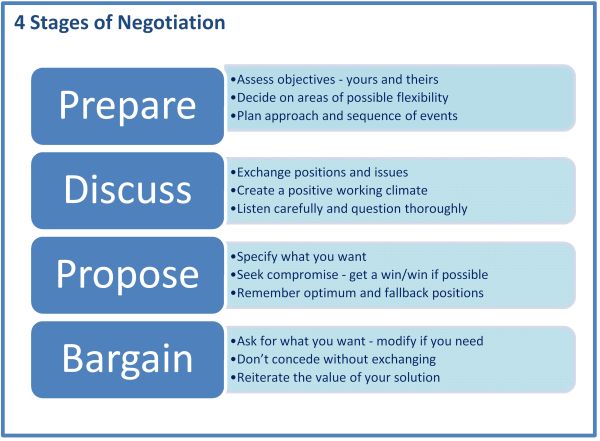A negotiation is not restricted to a communication between just two parties.
For instance: a trade union, employer, employees and potentially the government could be involved in a high profile pay negotiation.
Types of Negotiations
The Negotiators
Before starting a negotiation, find out:
- The names/roles of the people with whom you will be negotiating.
- Whom or what does each party seek to represent in that negotiation? For example: a human resources negotiator might represent a company as a union represents the workers.
- Any relevant background from past negotiations.
- The (probable) success criteria for each party to the negotiation – the tangibles and the emotions.
- The authority level each party has in concluding a negotiation. Negotiations do take place between people who do not have the authority to enforce an agreement.
When Authority is Outside of the Negotiation
When authority is held outside of the negotiation, consider:
Is an external authority merely a tactic?
Sometimes negotiators want to avoid being ‘put on the spot’ or are nervous that they may be panicked or pressured into an agreement they might later wish to reconsider. So, they create and external authority to provide the ‘escape-clause’. However:
There could be valid reasons for introducing an external authority:
Perhaps external authority is needed to sanction the efforts of someone ‘learning’ to negotiate or because those in authority do not have the time to go through all the necessary detail.
Successful negotiations can be undertaken with external authorities, providing the success criteria of external authorities are established before or in the early stages of the negotiation.
The Experts
An ‘expert’ might be introduced during or at the end of making an agreement. These people can typically stall, but not stop, a negotiation. For instance:
A lawyer might stall negotiations over buying a house by raising legal concerns. The lawyers, however, have no authority to walk away from the negotiation – only the parties they represent can do that.
Experts can be used for positive reasons – perhaps to discuss highly technical issues for which the negotiators don’t have the necessary understanding or knowledge. Preferably, expert involvement would be agreed at the outset of a negotiation, but if they are introduced before negotiations are concluded, it is manageable. But sometimes:
Experts can be introduced unexpectedly:
Let’s say a customer agrees to have a custom-made luxury yacht designed and built. The fixed price deal is signed and then – but only then – the customer introduces an engineering crew to review the yacht’s manoeuvrability. They might then ask for changes to the specification, which might wipe out the yacht-builder’s profit.
On such a fixed price contract, the experts have been introduced too late in the negotiation. Had it been known – and publicized – in advance that these experts were being involved, caveats could have been entered into the fixed price contract for a renegotiation should it be proven necessary?
There is one more aspect to consider about the introduction of an expert:
Is the use of an expert a tactic?
Occasionally, an agreement will be made subject ‘to contract’ or ‘agreed terms and conditions’ which are drawn up by experts not involved in the negotiation.
There’s nothing inherently wrong here – but it can be abused:
Detail drawn up by experts can hold surprises, so value experts but be aware of them
Negotiating Team
Picture the scene: A supplier goes to negotiate with a customer’s organization and comes face to face with a panel of eight people!
Now this shouldn’t happen because we have already advocated that you should know who you are going to negotiate with before you start. If you then believed it necessary, you might also take along a panel of eight negotiators.
If you are faced with a panel, remember:
Each member of the panel might have their own needs and wants - and they may be in conflict.
Should you decide on team negotiating, call a team meeting before the negotiations start and:
- Explain/clarify why a team is required.
- Understand everyone’s needs and wants. This may involve an internal negotiation!
- Identify roles and responsibilities during the discussions, including that of a chairperson.
- Determine how any disagreements within the team will be dealt with away from the other negotiating parties.
- Plan how any team member should respond if approached individually by one of the other parties. Such an approach might be deliberate or accidental and can be highly detrimental – especially if one panel member is quoted as saying something which is a complete surprise to the rest of their team.
- Emphasize that no one has the sole authority to make the agreement. (This necessitates adjournments for the team to discuss progress among themselves.)
